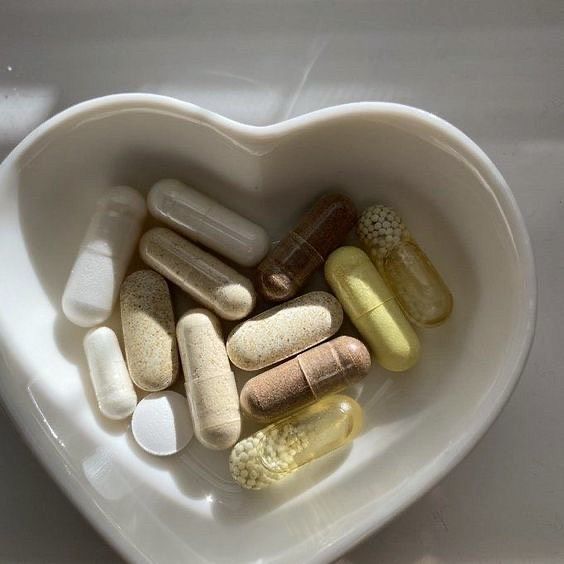Pregnancy & Supplements: What You Really Need

Pregnancy is a season of big changes—and big questions!
Suddenly everything you eat—or don’t eat—feels more important than ever. You’re growing a tiny human, and with that comes a whole new focus on nutrients, vitamins, and what’s best for both you and your baby.
And when it comes to supplements? The information can be so overwhelming.
Do I need a prenatal? Should I take iron? Is iodine really important? What if I’m already eating really well?
Let’s clear the confusion and break it down.
First things first — talk to your healthcare team
Before diving in, it's important to know: every pregnancy is unique and everyone has different needs.
So, before diving into supplements, always check in with your doctor, midwife, or dietitian for your personal recommendations. Your needs can vary based on your diet, medical history, blood work, and the stage of your pregnancy.
So, why supplement?
While a balanced, varied diet is always the foundation, pregnancy increases your nutrient needs, and symptoms like nausea or fatigue can make it tricky to meet those needs through food alone.
That’s where supplements come in. They’re not a shortcut, but they are a practical way to help cover your bases, especially during this nutrient-demanding season.
Let’s break down what matters most.
Essential Supplements During Pregnancy
Based on Australian health guidelines, the following supplements are recommended for most pregnant women.
Folic Acid (Folate)
-
Why it's important: Crucial for neural tube development, reducing the risk of neural tube defects like spina bifida.
-
Recommended dosage: 400–500 micrograms (µg) daily, starting at least one month before conception and continuing through the first trimester. Some women may require higher doses; consult your healthcare provider for personalised advice.
Iodine
-
Why it's important: Supports the development of the baby's brain and nervous system.
-
Recommended dosage: 150 µg per day throughout pregnancy and breastfeeding.
Vitamin D
-
Why it's important: Assists in calcium absorption and supports bone health.
-
Recommended dosage: Supplementation is advised only for women with vitamin D deficiency. Dosage should be determined based on blood test results.
Iron
-
Why it's important: Necessary for the production of extra blood (haemoglobin) for both mother and baby, and helps prevent anaemia.
-
Recommended dosage: Routine supplementation isn't recommended for all. Iron supplements should be taken if a deficiency is diagnosed through blood tests.
Situation-Specific Supplements
Depending on individual dietary habits, blood test results and health needs, additional supplements may be considered. Please check with your health care team before considering any of the following additional supplements.
Vitamin B12
-
Why it's important: Essential for neurological function and red blood cell formation.
Who may need it: Vegetarians, vegans, or those with limited intake of animal products.
Calcium
-
Why it's important: Supports the development of strong bones and teeth in the baby.
-
Who may need it: Women who are lactose intolerant, vegan, or have low dietary calcium intake.
Omega-3 Fatty Acids (DHA)
-
Why it's important: Contributes to the development of the baby's brain and eyes.
-
Who may need it: Women who do not consume enough oily fish.
Is a Prenatal Supplement Necessary?
Prenatal vitamins are formulated to support the increased nutritional needs during pregnancy. When selecting a prenatal supplement:
-
Consult your healthcare provider: Always check with your doctor or dietitian before starting any new supplements to make sure they’re right for you.
-
Ensure it contains the recommended amounts of folic acid and iodine.
-
Consider your individual needs: If you have specific dietary restrictions or health conditions, additional supplements like vitamin B12 or calcium may be necessary.
The Bottom Line
Every pregnancy is different, and so are your individual needs. While a balanced diet is the foundation, supplements can play an important role in supporting both your health and your baby’s development - especially when getting in all the right nutrients every day feels impossible.
Some days, you might feel on top of it. Other days, you might be too nauseous, too tired, or too full to even think about a balanced plate - and that’s okay.
This season isn’t about perfection - it’s about listening to your body, slowing down, and leaning into what feels good and doable each day.
Remember: you’re growing a human which is already incredible. ❤️
Need support with meal ideas or nourishing options during pregnancy?
Check out the MWU app for balanced, simple recipes that can easily be adapted across all stages of life - including this one.
And if you're looking for extra guidance tailored to each trimester, our Pregnancy Program is here to support you every step of the way.
The information shared in this blog is general in nature and not intended to replace personalised medical advice. While we aim to provide helpful, evidence-informed guidance, always consult with your healthcare provider or a qualified medical professional before making changes to your diet or lifestyle during pregnancy. Your individual needs and circumstances matter most.
References & Further Reading
For further evidence-based guidance on pregnancy nutrition and supplements, explore these resources:
Nutrient Reference Values for Australia and New Zealand. Comprehensive guidelines outlining recommended nutrient intakes during pregnancy. NHMRC Nutrient Reference Values
Healthy Eating During Pregnancy. Advice on essential nutrients and dietary choices to support a healthy pregnancy. FSANZ Healthy Eating During Pregnancy
Pregnancy Care Guidelines. National guidelines providing evidence-based recommendations for pregnancy care. Australian Government Pregnancy Care Guidelines. The Australian+6canberrahealthservices.act.gov.au+6Consultations+6
Pregnancy and Diet. Information on nutritional needs and healthy eating habits during pregnancy. Better Health Channel – Pregnancy and Diethealthyliving.nsw.gov.au
Healthy Eating When You're Pregnant or Breastfeeding. Guidelines on maintaining a nutritious diet throughout pregnancy and breastfeeding. Eat For Health – Healthy Eating During Pregnancy








